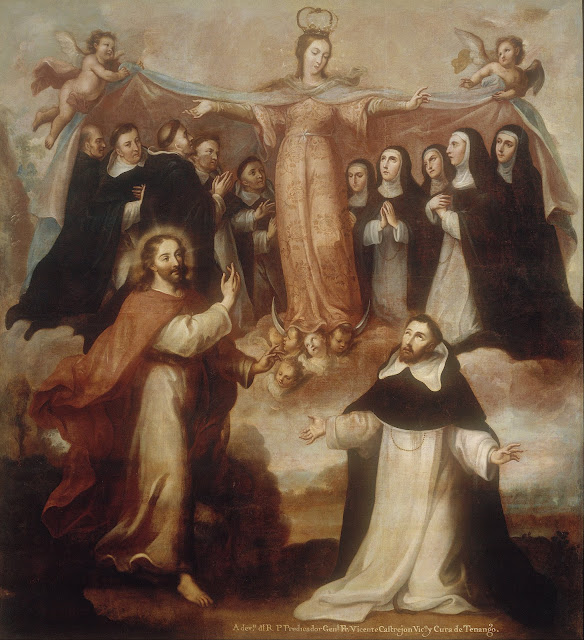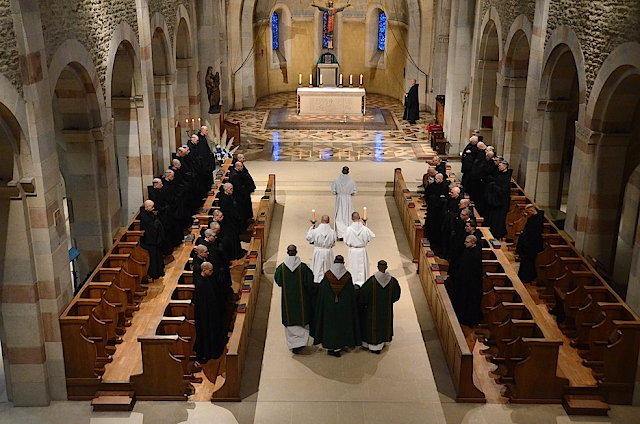Catholic devotions for the 23 October
Scroll down for today's
Saint of the Day
Reading of the Martyrology
Dedication of the Month
Dedication of the Day
Rosary
Five Wounds Rosary in Latin
Seven Sorrows Rosary in English
Latin Monastic Office
Reading of the Rule of Saint Benedict
Celebration of Mass
Reading from the School of Jesus Crucified
Saint of the Day
Reading of the Martyrology
Dedication of the Month
Dedication of the Day
Rosary
Five Wounds Rosary in Latin
Seven Sorrows Rosary in English
Latin Monastic Office
Reading of the Rule of Saint Benedict
Celebration of Mass
Reading from the School of Jesus Crucified
Our Lady Patroness of All Dominican Saints and Blesseds
Feast of Blessed Henry of Cologne
Died in Cologne, Germany, 1224 or 1225. One of the first Dominicans recruited from among the students of the university of Paris, Henry became the first prior of the friary at Cologne. He was the closest friend of Blessed Jordan of Saxony, who knew, understood, and promoted friendships as important to the spiritual life. Henry met Jordan when the latter was a professor at the University of Paris. Henry must have been a very personal young man of fine character, for Jordan named him the very flower of the Dominicans. He was "handsome, reverent and virtuous, of a mind to grasp everything and with a rare faculty for expressing himself."
When Reginald of Saint-Gilles died, Jordan had a vision in which he saw in the cloister of Saint- Jacques a clear and limpid fountain that ran dry. In its place a fountain sprang up, having two heads, surging up like a great river to water the whole earth. It was revealed to him that Henry was one of the fountainheads, and the brethren easily understood that Jordan himself was the other.
By this time Jordan had decided to abandon his academic career and join the Dominicans. But he could not bring himself to leave behind his dearest friend. Often he would later say in sermons, "You do not go to a banquet alone, but with your dear friends; you should not go alone to heaven either!" Jordan's success in recruiting young men for the order is probably due to this attitude. He could not imagine anyone going into the joy of religious life without bringing his friends along with him. So Jordan delayed entering the order until Henry was ready to do so, too.
After Henry completed his studies in the arts and theology in Paris, Jordan began recruiting him. When Jordan returned from confession to Reginald, shaken and exalted by the ideals that Reginald had envisioned for him, he looked for and found a Scripture text to confirm his resolution. Then the book fell open to the text he wanted for Henry, "Let us stay together, let us never separate." He urged this on Henry, but the young man, who was chaste and obedient, found it difficult to accept poverty.
Henry argued with himself, prayed and meditated, but still was unable to accept the precept of abandoning all things for the uncertainties of a mendicant life. One night, after he had prayed for a long time, he saw himself at judgement, and a thunderous voice demanded of him, "And you--what have you given up for God?" Henry was shaken by this thought, went to see Master Reginald, and resolved to enter the order as soon as possible. On Ash Wednesday, 1220, the two friends went together to be received.
Jordan, a magnetic preacher, thought that Henry was the model of preachers. Our image of Henry is highly idealized because the only records remaining are those written by Jordan. In 1221, when the priory of Cologne was established, Henry was sent there as prior, and Jordan went to Lombardy. It was a sorrow to see the friends separated, but they wrote frequently. Theirs was a friendship based on the love of God and directed to the furthering of His kingdom.
At about the age of 35, Henry died suddenly in the arms of Jordan, who was visiting Cologne. It was a terrible grief to Jordan, and his letter concerning the death of Henry is one of the saddest and most beautiful of all his eloquent writings. He writes to Blessed Diana in the rawness of his sorrow, "Do not grieve too much about the death of your sister Otta . . . it is good for us to be saddened now at the same time, to go sowing our seed in tears; at the harvest we shall come carrying our sheaves in joy." Jordan confesses that he wept copiously for his friend and, after giving a beautiful account of the last moments of Henry, he adds, "There is still a long way to go. If you are tired, your Jesus was also . . . in all humility, in all patience, He knew how to wait" (Benedictines, Dorcy).
This Day, the Twenty-Third Day of October
In the territory of Ossuma, in Spain, near Cadiz, the holy martyrs Servandus and Germanus, in the persecution of Diocletian, under the lieutenant Viator. After being subjected to scourging, imprisonment in a foul dungeon, want of food and drink, and the fatigue of a very long journey, which they had to perform loaded with fetters, they at length reached the term of their martyrdom by having their heads stricken off. Germanus was buried at Merida, and Servandus at Seville.
At Antioch, in Syria, the birthday of the holy priest St. Theodore, who was arrested in the persecution of the impious Julian. After being racked, after suffering many severe torments, and the burning of his sides with torches, as he persevered in the confession of Christ, he was put to the sword, and thus consummated his martyrdom.
At Granada, in Spain, blessed Peter Paschasius, bishop of Jaen and martyr, of the Order of Mercedarians. He suffered on the 6th of December.
At Constantinople, St. Ignatius, bishop, who, for having reproved the emperor Bardas for putting away his wife, was subjected by him to many insults and driven into banishment. Being restored to his See by the Roman Pontiff Nicholas, he finally rested in peace.
At Bordeaux, St. Severin, bishop of Cologne and confessor.
At Rouen, St. Romanus, bishop.
At Salerno, St. Verus, bishop.
In Picardy, St. Domitius, priest.
In Poitiers, St. Benedict, confessor.
And elsewhere in divers places, many other holy martyrs, confessors, and holy virgins.
Omnes sancti Mártyres, oráte pro nobis. ("All ye Holy Martyrs, pray for us", from the Litaniae Sanctorum, the Litany of the Saints)
Response: Thanks be to God.Source
Devotion to the Rosary for 23rd October
"And Joseph taking the body wrapped it up in a clean linen cloth ; and laid it in his own new monument which he had hewed out of a rock." Matt. 27/59-60.
A REVIEW
From the death of St. Joseph until the death of Her Divine Son, the sorrows of Mary accumulated and intensified until beneath — not the shadow — but beneath the cross itself the climax of human endurance in suffering was experienced by Mary. ''The sword of grief" had pierced her soul : and only the gentle but all-powerful hand of her Divine Son possessed the strength to dislodge it! He and He alone could withdraw that jagged blade from her transfixed heart. But if Mary's sorrows were unfathomable, the glories that awaited her were likewise beyond compute. And it is to the mysteries of these glories that we now progress in our study of the Holy Rosary.
HYMN
"Wliat a sea of tears and sorrows
Did the soul of Mary toss
To and fro upon the billows
While she wept her bitter loss ;
In her arms her Jesus holding.
Torn so newly from the cross.
"O that mournful Virgin Mother!
See her tears, how fast they flow
Down upon His mangled body, \
Wounded side, and thorny brow !
While His hands and feet she kisses
— Picture of immortal woe."
Monday is the Day dedicated to the The Holy Ghost & the Souls in Purgatory
The Joyful Mysteries of the Rosary are prayed on Monday
"I would like to remind you that the Rosary is a biblical prayer, all filled with the Holy Scriptures." It is a prayer from the heart, in which the repetition of the Ave Maria directs the thought and affection towards Christ, and thus is made a confident prayer to Him and our Mother. It is a prayer that helps to meditate on the Word of God and assimilate the Eucharistic Communion, on the model of Mary who kept in her heart everything Jesus did and said and even His Presence. " Pope Benedict XVI
The Rosary in Latin
Chaplet of the Five Holy Wounds of Christ in Latin
Chaplet of the Seven Sorrows of Our Lady in English
Latin Monastic Office for today from Le Barroux in France Texts also provided
The Reading of the Rule of Saint Benedict for October 23
XVIII QUO ORDINE IPSI PSALMI DICENDI SUNT
7 Ad tertiam vero, sextam nonamque secundae feriae, novem capitula quae residua sunt de centesimo octavo decimo, ipsa terna per easdem horas dicantur.
8 Expenso ergo psalmo centesimo octavo decimo duobus diebus, id est dominico et secunda feria,
9 tertia feria iam ad tertiam, sextam vel nonam psallantur terni psalmi a centesimo nono decimo usque centesimo vicesimo septimo, id est psalmi novem.
10 Quique psalmi semper usque dominica per easdem horas itidem repetantur, hymnorum nihilominus, lectionum vel versuum dispositionem uniformem cunctis diebus servatam.
11 Et ita scilicet semper dominica a centesimo octavo decimo incipietur.
CHAPTER 18: IN WHAT ORDER THE PSALMS ARE TO BE SAID
7 At Terce, Sext and None on Monday are said the nine remaining sections of Psalm 118, three parts to be said at each hour.
8 Thus having completed Psalm 118 in two days (that is Sunday and Monday),
9 on Tuesday at Terce, Sext and None three psalms each are chanted from Psalm 119 through 127, that is from nine psalms.
10 These psalms are always repeated until Sunday at the same hours every day: the disposition of hymns, lessons and versicles remains uniform on these days.
11 And so in this way Psalm 118 is always to begin on Sunday.
Today's Celebration of the Mass
May the Passion of Jesus Christ be always in our hearts













.jpeg)

Comments